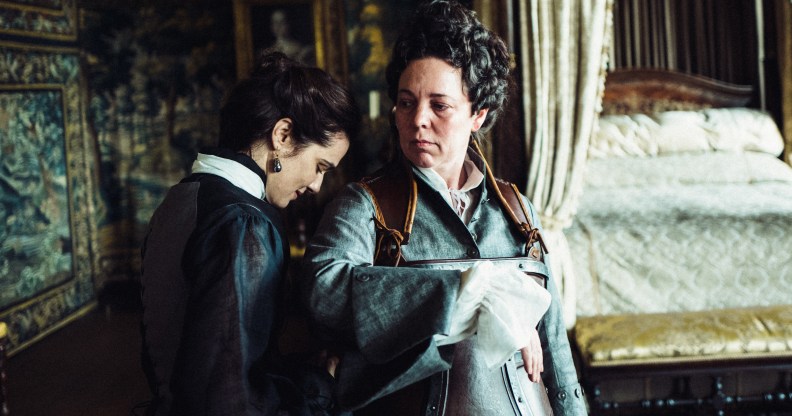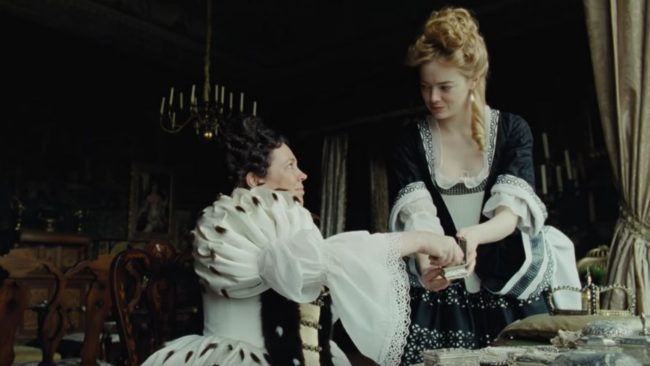The Favourite: The true story behind Queen Anne’s lesbian affairs in Oscar-tipped movie

Oscars nominees Rachel Weisz and Olivia Colman in The Favourite. (Twentieth Century Fox)
Period comedy-drama The Favourite has already dominated the BAFTAs and it’s got 10 nominations for the Oscars on Sunday (February 24). But, as the UK marks LGBT History Month, how realistic are the lesbian affairs depicted in the film?
What is the true, real-life story of Queen Anne and has The Favourite prioritised fact over fiction? We explore what historians have said about the period.
Directed by Yorgos Lanthimos, The Favourite follows the reign of Queen Anne (Olivia Colman) when England is at war with France in the early 18th century. It portrays two cousins, the Duchess of Marlborough, Sarah Churchill (Rachel Weisz), and Abigail Masham (Emma Stone), who fight it out to be court favourites of Queen Anne, including their salacious lesbian affairs with the monarch.
Historical accuracies of The Favourite debated by historians
The historical accuracy of the film, which has already bagged seven BAFTA awards, including best actress for Colman, has been hotly debated—from middle-aged parents discussing the lesbian romps in Aga-heated kitchens in southern England, to millenials frantically Googling the “historical accuracy of The Favourite” after watching it that afternoon in their local cinema.
So, how much of the 2019 Oscar-nominated movie The Favourite is real? According to historian Ophelia Field, author of the Sarah Churchill biography The Favourite, which recounts the historical story behind the recent film, Queen Anne’s letters to Lady Churchill were, indeed, of a romantic nature.
Field, whose biography of Churchill was first published in 2002, before being updated to coincide with the release of the film, says she started researching Queen Anne’s letters written from the 1680s onwards, and “was struck by the fact that they were love letters.”
Queen Anne’s real life letters to Lady Churchill were romantic
Field explains that she then did some reading around the topic to “try to contextualise how freakish or how typical these were for the period,” only to discover that the Restoration court—covering the period approximately from the return of the monarchy under Charles II in 1660 until the death of Queen Anne in 1714—was characterised by strong female friendships, which may have been sexual.
“What became clear was that in the Restoration court in which Anne and Sarah grew up—which was a sexually decadent place, though that’s usually been thought about more in a heterosexual way—there was a sort of mini-culture of very passionate relationships between the young maids of honour,” explains Field.

Emma Stone with her co-stars in the Oscar nominated lesbian film, which upends period drama stereotypes (Gareth Cattermole/Getty)
Field adds that Queen Anne’s letters to the Duchess of Marlborough have to be read “in the context of how she obviously absorbed this romantic same-sex culture of the Restoration court.” The historian goes on to highlight several women who she believes were involved in romanticising one another, including Francis Aspley, with whom, she says, Queen Anne’s older sister Princess Mary—later Queen Mary II of England—was “really in love.”
The academic reads aloud one letter from Princess Mary to Apsley, who she calls her “husband,” in which the royal says she longs to “kiss the ground on when once you go, to be your dog on a string.”
“It’s not implausible to imagine that there’s some physical expression within all of this, and the intensity is certainly much closer to our modern ideas of sexual love than to our modern ideas of friendship.”
—Ophelia Field
Still, Field is quick to admit, we can never know for certain whether the same-sex desire outlined in these letters was acted upon physically, as is suggested in the film.
“Whether any of these relationships were physically consummated is a whole other question—and one that we will never have a concrete answer to,” explains Field.
She highlights one moment in the film where Churchill sends a furious letter to Anne, effectively threatening to “out” her in response to her relationship with Baroness Masham, which is based on a real letter. For Field, the contents of this letter show that Churchill “fully knows that the reputational threat to Anne is the accusation of lesbianism, even if they didn’t have the word lesbian.”
We will never have a “concrete answer” over The Favourite‘s lesbian affairs, says historian Ophelia Field
But Field explains that she is frequently frustrated by certain academics who claim that such physical lesbian affairs could never have happened. “The position I take is impatience with certain male historians who infantilize the women and talk as if these letters are only between very young girls,” she adds. “Earlier biographers couldn’t even imagine the possibility that anything was felt erotically, if not acted upon.
“I think it’s not implausible to imagine that there’s some physical expression within all of this, and the intensity is certainly much closer to our modern ideas of sexual love than to our modern ideas of friendship.”

Olivia Colman (left) and Emma Stone starring in The Favourite, which has ten Oscar nominations, as Queen Anne and Abigail Masham respectively. (Twentieth Century Fox)
Other academics, however, maintain a more sceptical view over whether Queen Anne’s relationships with Churchill and Masham amounted to anything more than passionate friendship.
Historian Anne Somerset, author of biography Queen Anne: The Politics of Passion, says that, while the film “takes it as a complete given that Queen Anne had active lesbian relationships with the Duchess of Marlborough and Abigail,” she believes that it is “certainly not as straightforward as that.”
For Somerset, the question of whether Queen Anne actually had sexual relationships with the two women is “very complicated.”
The Favourite: Queen Anne’s husband was “written out of existence,” says academic Anne Somerset
Like Field, Somerset acknowledges that there was a “cult of female friendship” during this period in the Restoration court, noting that this has led some to wonder whether Queen Anne’s relationship with Churchill particularly was “more than friendship,” given the letters exchanged between them.
However, Somerset argues that both Anne and Churchill’s relationships with their husbands—and Anne’s 17 pregnancies—are somewhat sidelined in the film. Regarding Anne, Somerset says that her relationship with her husband George of Denmark, who died in 1708, was “just conveniently written out of existence” in The Favourite.
“Maybe I’m very naive, but I actually don’t really believe that Anne and Sarah had a lesbian relationship.”
—Anne Somerset
Somerset stresses that there is “every sign that she was absolutely devoted to him,” adding that Anne was “totally devastated” when her husband died.” Churchill, she believes, had a “very passionate marriage with her husband, too.”
“Maybe I’m very naive, but I actually don’t really believe that Anne and Sarah had a lesbian relationship,” she says, adding: “I personally think that [Anne] wasn’t a lesbian.”
Somerset does acknowledge that there was an element of tension between Churchill and Anne when Masham arrived on the scene, which is depicted as an intense love triangle in The Favourite. But, she says, Queen Anne had a “completely different” relationship with Masham, which she suggests was more formal because she addressed Masham using her surname.
Overall, Somerset believes that the film has helped trigger a heightened interest in Queen Anne’s reign, which may not have happened otherwise. And, although the historian takes issue with the film’s portrayal of Anne as “very monstrous”—claiming she “was a totally mannered woman”—she adds: “Apart from that, I keep telling myself that it’s all a good thing.”

